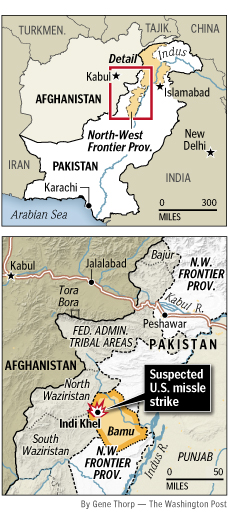
Residents stand on the rubble of shops and a house damaged in the fighting between Pakistan army and militants in Kanju, a troubled area of Pakistan’s Swat Valley, Tuesday, Nov. 18, 2008. Pakistani security forces are engaged in fierce fighting against militants and Talibans in various areas including Swat Valley, a northwest region that used to be beloved tourist destination. (AP Photo/Sherin Zada) (Sherin Zada – AP)
 |
ISLAMABAD, Pakistan — The U.S. military apparently struck at Islamic militants outside Pakistan’s lawless tribal belt for the first time Wednesday, firing a missile that killed six suspected insurgents taking refuge away from the conflict zone along the Afghan border.
The government denounced the attack as yet another “grave provocation” amid a series of U.S. military operations in the country that have enflamed widespread anger among ordinary Pakistanis.
The harsh words were a sharp contrast to comments Tuesday by U.S. and NATO officials who reported increased cooperation from Pakistan in the fight against militant groups. Tens of thousands of U.S. and NATO troops are stationed in neighboring Afghanistan.
“It looks like the Americans are not listening, but this is such a great provocation that it will bring a strong response from the government of Pakistan that will dissuade them,” presidential spokesman Farhatullah Babar said of the latest missile strike.
He declined to say what the response would be.
The government, which relies heavily on U.S. financial aid, has not gone beyond criticizing raids. Some experts question whether the leadership secretly condones the attacks while speaking out publicly against them, but the government denies that.
Although many militants have died in the U.S. strikes, Pakistani leaders have repeatedly called for a halt, saying the raids also often kill civilians and undercut public support for their own war against the extremists.
The United States has staged some 20 missile strikes and at least one commando assault inside Pakistan since August, a barrage seen as a sign of Washington’s frustration with the inability of its nuclear-armed ally to curb militants blamed for rising attacks in Afghanistan.
All the previous attacks had come in North and South Waziristan, semiautonomous tribal areas bordering Afghanistan. But Wednesday’s attack blew up a house in Indi Khel, a village in the Bannu district about 30 miles from the Afghan border and beyond the tribal region.
The identities of those killed were still being investigated, but a senior military officer said “the Americans are very confident” an al-Qaida member identified as Abdullah Azam al-Saudi was among the victims. He did not elaborate.
Earlier, two Pakistani intelligence officials said their agents reported that militants from Central Asia were believed to be among the six dead. They also insisted on anonymity.
All the officials spoke on condition of anonymity because they were not authorized to release the information.
Villagers denied any militants were among the dead, but they declined to discuss the identity of the victims. “Go!” one man shouted at a cameraman who pressed for details while shooting footage obtained by AP Television News.
Adnan Khan Wazir, a Bannu lawmaker, also insisted that only civilians died.
While Bannu is inland from the frontier tribal areas, it is still a dangerous place, and it falls under the control of the regional government _ making the attack specially sensitive.
A large Islamist political party threatened to block two major Pakistani roads used to truck supplies to U.S. and NATO troops in Afghanistan unless the cross-border attacks stop.
“If these missiles attacks continue, then we will ask the people to create hurdles in the way of supplies for NATO,” said Qazi Hussain Ahmed, chief of Jamaat-e-Islami, which has shown it can mobilize thousands of supporters at short notice.
The supply lines have never been blocked by protests, but militants and criminals often attack trucks traveling them.
The U.S. rarely confirms or denies involvement in strikes inside Pakistan, which are believed to be carried out mainly by unmanned CIA drones flown from across the border in Afghanistan.
Last week, CIA chief Michael Hayden claimed pressure on militants in the tribal region had put al-Qaida “off-balance.”
Pakistani President Asif Ali Zardari has little leverage to force the U.S. to stop the attacks, analysts say. Pakistan receives millions in U.S. military and development aid each year and is about to receive an emergency loan from the International Monetary Fund to bolster the economy.
Some analysts have speculated the government has a secret agreement with Washington that allows the attacks on condition that U.S. officials do not admit to them. Zardari and other Pakistani officials strongly deny that.
In a sign of the complex relations between the two countries, U.S. and NATO military officials have praised what they say is improved day-to-day Pakistani cooperation in squeezing militants along the border.
American officials said Tuesday that troops in Afghanistan coordinated with Pakistanis over the weekend to allow artillery shelling of insurgents who were firing rockets across the border. Pakistan’s official statement on the matter referred only to militant activity in Afghanistan.
Over the past month, NATO and Pakistan also have cooperated in Operation Lion Heart, a series of complementary offensives involving Pakistani army and paramilitary troops on one side of the border and NATO forces on the other, said Col. John Spiszer, U.S. commander in northeast Afghanistan.
American officials have also praised a Pakistani offensive in the Bajur tribal area that has the government says has killed 1,600 militants in the past three months. Pakistani officials also are trying to persuade tribes to turn against the militants.
___
Associated Press writers Munir Ahmad in Islamabad, Riaz Khan in Peshawar and Ishtiaq Mahsud in Dera Ismail Khan contributed to this report.
By STEPHEN GRAHAM
The Associated Press
Wednesday, November 19, 2008; 3:41 PM
Source: The Washington Post